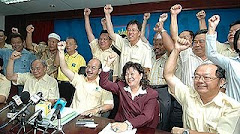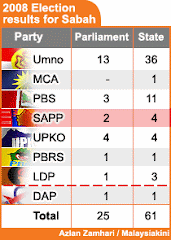The disenfranchisement and the resentment in Sabah towards federal politics and policies are very real, realities created by the BN administration. The dynamics that are being witnessed today is just a situation ripe to play mind games with.
 SABAH for Sabahans” gained its zenith of popularity during the Parti Bersatu Sabah (PBS) rule in the state.
SABAH for Sabahans” gained its zenith of popularity during the Parti Bersatu Sabah (PBS) rule in the state.To a puritan federalist it is almost treasonable. But to many proud Sabahans who remember the 1980’s struggles, it was a term that gave rise to a generation of Sabahans whose political consciousness was awoken by a sense of identity that was multi-racial, open and most of all, confident. We stood tall because we had dared challenge the federal regime of the day.
With all the talk of Sabah MPs crossing over to Pakatan Rakyat, and if anyone believes this to be another wave of Sabah defiance, they are dead wrong.
Sabahans still stand in awe when we see the shape of Mount Kinabalu sitting in the blue hues of our state flag. And in reality, the mountain is an awesome sight by itself. “Sabah Maju Jaya” is still sung with great pride by every Sabahan with no exception to any race.
We should be so insulted to be painted as a bunch of shenanigans with no virtue, moral standing or principles.
The disenfranchisement and the resentment towards federal politics and policies thus far, are very real. But these are realities created by the BN rule. The dynamics that we witness today is just a situation ripe to play mind games with.
Sabahans have to live every day of their lives alongside reportedly, two million illegal immigrants compared to one million locals. Their children litter the streets in the cities begging for scraps and odd jobs, unable to attend school, as they have no official papers.
By the day, Kota Kinabalu is looking more like Manila than Malaysia. By any moral standard, how can we allow poverty and human suffering to come to this level – whether or not we choose to recognise them as full citizens is another matter.
Sabah ranked from being the richest state in 1970’s to being the poorest state. Using UNDP’s numbers, Sabah has a poverty rate of 23.0% compared to Wilayah Persekutuan-KL of 1.5%!
In the district of Nabawan, the poverty rate is as high as 70.8%, as 21,568 households live in hardcore poverty. The dropout rate is 50%, twice the national figure and most schools located in the rural areas are equipped with very poor facilities.
Children are so poor that they do not even have soap to clean themselves with. Children attend classes naked because parents sell their free uniforms to feed their families.
In the Ninth Malaysia Plan, the total allocation for Sabah makes up 7.69% compared with 15.06% for the Federal Territories.
These are just hard numbers.
Sabah won 24 out of 25 seats contested. However, it’s still only 25 seats out of the 140 seats garnered by the BN. The lack of representation at ministerial level in truth is limited when both the states combined only represent 1.7 million out of the 10.9 million registered voters.
While Sabah and Sarawak may have held a crucial deciding factor to retain BN’s simple majority in this elections, many of the seats were won due to lack of cohesion among the Opposition parties. The extent of gerrymandering also contributed to no small amount to BN’s wins in the state.
Is this why Sabah representatives often complain that they are not treated with respect in all the political platforms from the Cabinet to grassroots, including those within their parties?
Today, both sides of the political fence paint Anwar Ibrahim in the same breath as how we saw Pairin Kitingan or PBS in the 80’s.
To begin with, Anwar Ibrahim is no Sabahan. In the 90’s, he was Finance Minister and PM-in-waiting “hero-rised” as a leader with international stature but in small-town Sabah, the people saw him as no more than an errand boy for Tun Dr Mahathir.
That said, has there been a credible Sabah leader that has been able to articulate our pain and concerns?
Is it really about more representation in the Cabinet and more royalties? Younger generations of Sabahans, unlike previous decades, are less likely to be anti-Federal.
Many of them have studied in Peninsular Malaysia in both private and public colleges and universities. They know what is like to live in a greater Malaysia beyond their Sabah shores.
Most also know that the 20-point agreement (signed when Sabah joined Malaysia) cannot be practically implemented if we are to finally come to terms with being part of Malaysia.
But what does it mean to be a Sabahan when two-thirds of the population are illegals? If the BN government does not want the situation to be hijacked by the Opposition, this is the first thing it must address – bring back what matters most to Sabah, our land.
The illegal migrant situation has become so bad that we already have a second, if not third generation of Filipinos and Indonesians born in Sabah.
In the name of humanity, I am not sure if we can even morally deport them without causing social mayhem and a localised economic collapse. But we need a definite closure because we need to move on.
“Sabah for Sabahans” conjures a lot of idealism as well as realities for many Sabahans even today but it does not mean we are less proud of who we are and what we still stand for. RESPECT and DIGNITY.
Whoever captures that, gets to rule.
Fui K. Soong is CEO of Institute of Strategic Analysis and Policy Research (INSAP), a think tank of MCA, an organisation dedicated to research on the removal of barriers and bias in policies that impede Malaysian unity, racial harmony and economic prosperity. You can e-mail her at fui4545@yahoo.com.




No comments:
Post a Comment